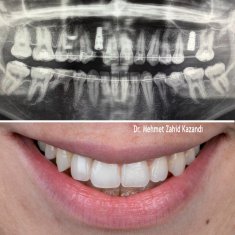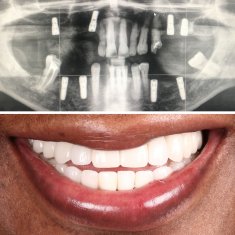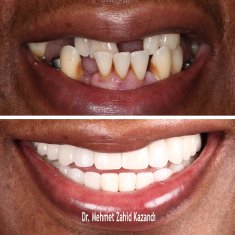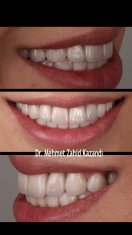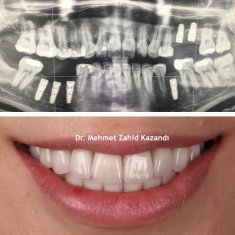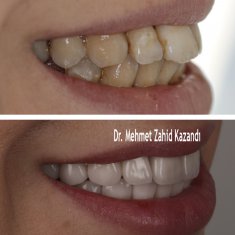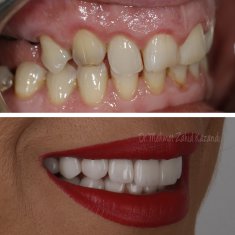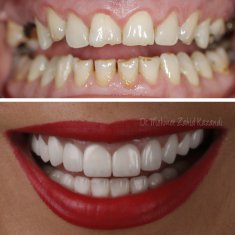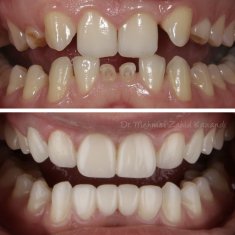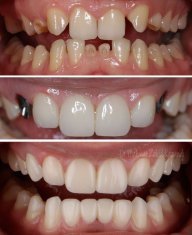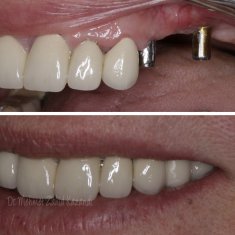Dental Implants
Get your second chance for smiling to the life, with your own customized smile design. Naturally, beautifully and affordably.
Dental Implants Before & After Pictures
Time Needed for Getting Your Dental Implants in Turkey
Dental implant operation is done with a dental surgeon in your first visit. Then it is time for waiting the implants to merge with your bones. Your crowns are arranged in your second visit after 3-6 months of first visit. Some patients may requires 3rd visit for final adjustments but for most clients, the second visit is final stage for using their dental implants with their crown attached. Therefore requires 2-3 visits in 3-9 months period
What is Dental Implants?
Dental implants are artificial tooth roots made of bio-material which is placed in the socket of the lost teeth to carry a tooth replacement. The material is generally pure, unalloyed titanium, which is completely accepted by the human body. You may look at our implant before < after pictures to get an idea of our quality of service in Dental Implants
Preparations for Implant Treatment
During preliminary examinations the dentist checks the patient to decide if placement of dental implants can be carried out. This includes a dental examination (which teeth must be substituted, if the jaw is suitable for receiving the implants, taking of X-ray shots, etc.), and general medical examinations (laboratory tests).
Application of Dental Implants
The insertion of implants is carried out under local anaesthesia. First the dentist prepares the given part of the jaw, then inserts the implant. The suture is removed 4-7 days later, and following this implants begin to heal under the gums.
Healing Period: after implants are implemented
The healing period lasts for about 3 months. During this time bone cells grow into the micro-pores created on the surface of the implant. This process is called osseo-integration, and ensures the implants fix in place and become able to support a normal biting load long-term without any damage.
Note: If you notice any change, attend a check-up examination as soon as possible.
Tooth Replacement Fixing on Implants
Then the tooth replacement is fixed onto the implants. First the implants osseointegrated under the gum are uncovered, then abutment pieces are fitted into them to support or retain the replacement. Following this, the prosthesis is prepared in the dental laboratory in a short time in the usual way.
The complete implant reconstruction process may take from 2 to 9 months.
Dental Implant Treatment Plan
1st Visit: Application of Implants
Consultation, dental X-ray, placing the implant into the jawbone (Your bone cells need to grow around the implant before the post can be attached to the implant),
Time required: 2-7 days
2nd Visit: Replacement Teeth for Implant
3-4-6-8 months later, Post is attached to the implant and the replacement teeth are prepared
Time required: 5-10 days
Personal Care after Getting Your Dental Implants Done in Turkey
Contact between patient and dentist does not stop here, with placement of the new teeth. Among the most important criteria for long-run success in dental implantation are good mouth hygiene and regular medical check-ups. Patients wearing implant-based tooth replacement must regularly attend examinations once a year. Then the dentist verifies the state of the attachment of the bone and of the mucosa around the implant(s) and that of the tooth replacement, and makes the necessary corrections (e.g. removes plaque).
You may look at our dental implant case pictures and get more info about dental implants. Please read the Association of Dental Implantology UK’s information about dental implants
Dental Implant Prices for 5 Years Guarantee Implant Brands
ANKYLOS
- Total Implant, Ankylos (Friadent-Ger) – 5 years guarantee (standard abutment) €795
- Total Zirconium implant abutment (Zirconium abutment) €995
Dental Implant Prices (10 Years Guarantee) in Turkey
ZIMMER Implant Prices in Turkey
- Total – Zimmer Implant System (standard abutment) €850
- Total – Zimmer Implant System (Zirconium abutment) €1130
Straumann ITI Implant Prices in Turkey
- Total – Iti Implant System (standard abutment) €950
- Total – Iti Implant System (full ceramic abutment) €1395
Nobel Branemark Implant Prices in Turkey
- Total – Branemark Implant System (standard abutment) €1050
- Total – Branemark Implant System (Zirconium abutment) €1395
Notes for Dental Implants
The price of the implant system includes: Surgery + Implant + healing abutment + standard implant abutment or post.
Temporary replacement is only €30 / tooth.
With Plusdent a typical single tooth replacement (Ankylos) costs: Implant + Temporary Crown + Standard Abutment + Permanent Crown(pfm) = €944
FAQ on Getting Your Implants in Turkey
- 1. What is a dental implant?
- A dental implant is a substitute for a natural root and commonly it is screw or cylinder shaped.
- 2. How many teeth can be supported by implants?
- If you are missing just one natural tooth, then one implant is normally all that will be needed to provide a replacement. Larger spaces created by two, three or more missing teeth do not necessarily need one implant per tooth, however the exact number of implants will depend upon the quality and volume of bone at each potential implant site.
- 3. Who is suitable for dental implants?
- If you have good general health then dental implants will almost work for you. However, habits such as heavy drinking or smoking can increase the number of problems. If you have any other complicated medical problems then speak to someone with relevant experience. It is rare to have health problems that prevent the use of dental implants.
- 4. Do you need to have a healthy mouth?
- When you first enquire about dental implants it is often in response to an awareness of ongoing dental problems or the recent loss of teeth. Each of these problems will need to be diagnosed and treated in a logical manner, often placing implants in order to establish healthier conditions. If you are aware of bad teeth, loose teeth, or have noticed excessive bleeding, particularly when your teeth are cleaned professionally, you may have gum problems. Periodontal disease is a major cause of bone loss and with reduced bone density, dental implant treatment can be more complicated. Patient who have a habit of clenching or grinding their teeth may be at risk of overloading their implants. That is called `Bruxism`.
- 5. What else causes bone loss?
- Whenever a tooth is lost or extracted a considerable amount of the bone that once surrounded the remaining root portion may disappear. This loss can be particularly rapid during the first months and is described as `bone resorption`. Most people who have had dentures for many years will have needed a reline procedure to compensate for this bone loss. Therefore the longer dentures are worn, the more the amount of bone available for dental implants may be reduced.
- 6. Can dental implants preserve bone?
- This is one of the most important features of dental implants. Once in place with the surrounding teeth, everyday functional forces stimulate the surrounding bone which responds by becoming stronger and more dense. Like all things there are limits to how much work an implant can do. Your treatment provider will be able to discuss this in more detail as it relates to your case.
- 7. What can you do if an implant does not work?
- If an implant does not achieve or cannot maintain a rigid fixation with the surrounding bone it will eventually become loose and no longer be able to support replacement teeth. Commonly the failing implant causes no discomfort and if there are enough implants remaining, it may not be necessary to replace it at all.
- 8. How long does treatment take?
- For routine cases, from the time of implant placement to the time of placing the first teeth, treatment times can vary between 6 weeks and 6 months. The availability of better bone can be used to decrease treatment time, whilst more time and care must be taken with poorer bone, which can therefore extend treatment times beyond six months.
- 9. Are the new teeth joined together?
- When multiple implants are placed, they are routinely joined together in the same way that a bridge supported by natural teeth would be designed. If enough implants are available, it is often easier and just as effective to make several smaller sections of bridgework each supporting a few teeth. The bone quality and the number and position of the implants will largely determine which option is most suitable for you.
- 10. How do I look after the implants?
- For most implant-supported teeth you will be able to clean around each supporting implant by brushing and flossing in just the same way that you would around natural teeth and tooth supported bridges. It is reasonable to expect some of the daily hygiene procedures to be a little more complex than around your original teeth – expect to spend more time than you may have done in the past if you wish to maintain optimum implant health.
- 11. How long will the implants last?
- Once the implants and surrounding soft tissues are seen to be healthy and the new teeth comfortable and correctly adjusted, it is the quality of your home care and willingness to present for regular maintenance reviews that will have most influence on how long they will last. Well maintained implants placed into adequate bone can be expected to last for many years and probably for your lifetime.
- 12. How will you know if you are suitable for implants?
- Establishing good basic dental health is a key stage in any treatment plan. At your first day, you should be made aware of which problems are urgent, and what treatment is required to stabilize any gum or tooth related problems. It would be reasonable to expect a verbal routine of how your particular implant treatment might be approached.
- 13. What should I know before I start treatment?
- You will be given a written summary of your treatment planning discussions, highlighting your current dental situation and any alternatives there are to dental implants. This summary should also include an overview of the anticipated treatment is likely to take, how many implants are required and what the fees are expected to be.
- 14. Do you have enough bone for dental implants?
- There are now a number of advanced x-ray techniques which allow your jaw bone to be looked at in all three dimensions. The most accurate and widely available is known as the CT ( Computed Tomography) – OPG (Orthopantomograph) scan. Images obtained by CT scanning will normally be able to show all of the information required about your bone , including quantity and quality, but most importantly the presence of anatomical structures that must be avoided.
- 15. What anatomical structures must be avoided during the placement of dental implants?
- Upper Jaw: in the upper jaw, provided the implants stay with in the bone that once supported your own teeth there are really no important risk areas. If you have missing upper back teeth then the shape and location of the maxillary sinus can be shown to you. The maxillary sinuses can be seen on most x-rays and are therefore avoided. Lower jaw: In the lower jaw the most important anatomical structure to be avoided is the `inferior dental nerve`. This nerve runs from the area behind the wisdom teeth, passes under the molars and emerges onto the skin of the face in the region where your premolar teeth used to be. This is why a normal dental anaesthetic produces a numb lip even when the needle was placed right back of the mouth. If this nerve is disturbed or damaged during the placement of dental implants it can lead to temporary or even permanent numbness of the lip on the affected side. This is a rare but important complication. CT scans are generally the best means for identifying the location of this nerve and allow implants to be placed with considerable confidence.
- 16. Where can I have CT scan done?
- It is rarely available within a normal dental surgery environment. It will therefore require visit to a suitable hospital where the scan generally competed within few minutes.
- 17. Can dental implants be placed next to natural teeth?
- Dental implants are routinely placed beside natural teeth and this s generally very safe to do.The only exception to this would be if the natural root was very curved or tilted unfavourably in the proposed path of the implant. This could cause the root to be damaged by the implant, however this can usually be avoided by careful pre-operative planning.
- 18. Can you wear dentures during the course of implant treatment?
- If the teeth being replaced by dental implants are in a clearly visible part of your mouth it is most likely that you will want to have some teeth present whilst the treatment is underway. There are number of ways that this can be done, ranging from simple plastic dentures to removable bridges.
- 19. Is it uncomfortable when the implants are placed?
- Most patients will be very familiar with the dental anaesthetics used for routine dentistry and will know how effective they are. Implants are placed using same anaesthesia. The operation might take anything from 30 minutes for a single implant, to several hours for complex bone grafting and multiple implants placements. You can expect some minor swelling and occasionally bruising afterwards. For most patients, any of the simple painkillers you might take for a headache will be all that is needed for a few days.
